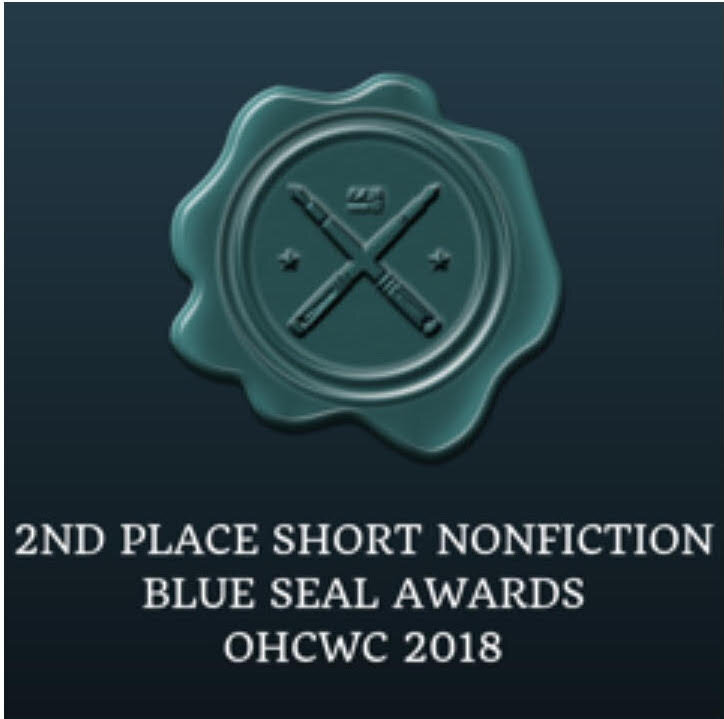This is hard to write; I still feel so foolish. It started with an oil painting. It happened during a visit.
My son-in-law paints, and his newly discovered talent prompted a request from my daughter, his wife, for her Mother’s Day gift. She chose a Russian Lomonosov cobalt net vase, filled with dogwood, as the still-life scene for him to create.
Over the course of weeks, the artist labored in secret behind closed doors. Finally, his work of art was ready - except that it was not dry. So, secretly he hid the canvas downstairs in the basement near the guest bedroom. Here it rested and slowly dried, day-by-day, as Mother’s Day drew near.
Enter visit by Larry and Debby.
Upon arrival, our son-in-law greeted us, and straightaway cautioned us to be aware of his drying treasure. He emphasized that six post-a-notes surrounded the object, lest we be tempted. They read:
DO NOT TOUCH. DON’T EVEN THINK ABOUT IT. WET PAINT.
In due course, I managed a few moments alone to admire his lovely work of art. I stood over the painting and studied every detail. I marveled at the way the brush strokes created a geometric net design on the vase. I noted the graceful curves of the dogwood branches. I smiled at his signature. And that is not all I did. Guess what.
I. Touched. The. Canvas.
Don’t ask me why; don’t ask me what happened; don’t ask me how I could lose my head and be so foolish. The answer to every question is the same: I don’t know!!! Before I even realized what had happened, the damage was done, and it was too late to take it back.
I gasped in horror, shocked at the result of my impetuousness. Did that really just happen? A SMUDGE shouted right back at me to affirm my worst fears. All the wishing in the world would not erase the evidence: Matt’s canvas was marred.
Immediately a war broke out inside of me: would I cover or would I confess? After all, who would notice? It wasn’t that bad, was it? Perhaps the smudge would just go undetected. What if I tried to repair it myself?
I stood frozen, gripping the counter and gazing at the evidence. As I accessed the damage, the Holy Spirit nudged me to take the high road of conscience and character. Own it; bring it to The Light. But I hesitated.
My internal self-talk went back and forth like a tennis match. Duce. Ad out. Duce. Ad in. Game point!
Hallelujah! The Holy Spirit’s prompting won. Whew. I heaved a sigh, swallowed my pride, and acknowledged what must be done. If I withheld confession, I would always live with the reality that I was hiding the truth. I did not want that; no - not at all.
Resolute, I slowly trudged up the stairs, and made my way to the kitchen. With humiliation and embarrassment, I uttered the only words that could be said: "Matt, I was so wrong. I touched the painting."
"I am sorry. Will you please forgive me?"
His warm and gracious response put my heart at ease, and he quickly disappeared downstairs to calculate the damage. Oh yes, the smudge definitely necessitated repair, but the artist’s skillful hand effectively covered my error.
Our relationship remains a treasure even greater than his art gift to our daughter. When I look at the painting in their home, I smile and remember the powerful importance of asking for forgiveness.
Asking for forgiveness, keeping short accounts, is essential to life and health, both physically and spiritually. Yet, we hesitate. We stand gripping the counter, and looking for the back door. Why? Mostly pride, but also stubbornness, rationalization, and FEAR.
To overcome these hurdles, we must be armed with Truth. A statement and a question provide the breakthroughs needed to keep short accounts, and allow relationships to thrive.
The statement: I am sorry.
The question: Will you please forgive me?
When in doubt, bring it to the Light. (I John 1:7) Say, “I’m sorry.” You won’t be sorry.
Question: When do you find it hard to ask for forgiveness? What holds you back?









